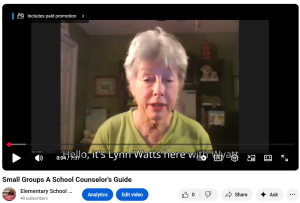Small Groups, Big Results: A Counselor’s Guide to Group Work
One of the most powerful tools elementary school counselors can use is the small counseling group. Small groups create an ideal setting to build trust, provide targeted support, and teach meaningful lessons—all while maximizing your time by reaching several students at once. Students benefit from shared experiences, peer support, and practical strategies they can take back to the classroom and beyond. What’s the downside? For me it was developing an effective system that I could repeat over and over rather than re-creating the wheel every year.
Why Small Groups Matter
-
Relationship Building: Meeting regularly in a smaller setting allows students to feel seen and heard, helping counselors develop deeper relationships with them.
-
Meaningful Lessons: Groups allow for interactive, hands-on activities that build essential life skills.
-
Efficient Use of Time: By serving multiple students simultaneously, counselors can provide more support without stretching themselves too thin.
Possible Small Group Topics
Small groups can be tailored to meet the unique needs of your student population. Some common and effective options include:
-
New Student Group: Helps new students transition smoothly, build friendships, and feel connected. This group provides a chance for you to meet with students and assess needs while encouraging them to make friends and feel a part of the school community.
-
Study Skills Group: Focuses on organization, time management, and test preparation. In addition, you could teach growth mindset which in itself alone has been shown in research to improve grades even without teaching specific academic skills.
-
Friendship Group: Supports students in learning how to make, keep, and repair friendships. This is a general group topic that could address self esteem issues as well as other social emotional learning topics.
-
Anxiety Group: Teaches coping strategies, calming techniques, and ways to manage worries.
-
Emotional Management Group: Provides tools for identifying feelings, self-regulation, and problem-solving. Groups around the issue of a specific emotion, most commonly anger management or anxiety, can teach students coping skills and provide opportunities to practice the strategies they are learning.
Tips for Setting Up and Running a Small Group
-
Identify Student Needs: Use teacher referrals, parent input, and counselor observations to determine who would benefit most.
-
Set Clear Objectives: Define the skills and outcomes you want the group to achieve.
-
Plan Ahead: Create a session outline with activities, discussion prompts, and materials ready to go.
-
Keep Groups Small: Aim for 4–6 students to encourage participation while maintaining manageability.
-
Establish Group Norms: Create simple rules for respect, confidentiality, and participation.
-
Use Engaging Activities: Incorporate role-plays, games, art, and stories to keep students involved.
-
Evaluate Progress: Gather feedback from students and teachers to measure growth and adjust future sessions.
Small groups are one of the most effective ways for counselors to make a big impact in a short amount of time. Whether you’re helping new students find their place, teaching friendship skills, or supporting students with anxiety, groups provide the structure and community children need to grow socially, emotionally, and academically.
Click here to watch video

